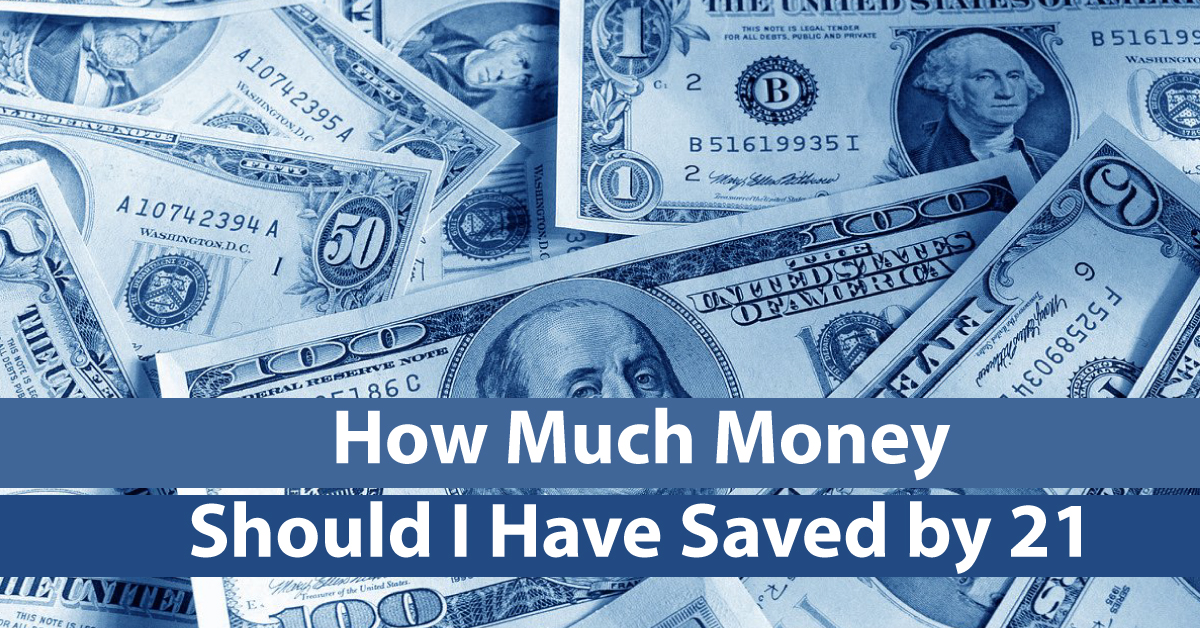The majority of 21-year-olds find it difficult to save money. Even if you are a frugal spender, you are most likely still far from reaching your earning potential.
According to the U.S. Bureau of Labor Statistics, the median weekly wages for a full-time worker between the ages of 16 and 24 is $611 as of the first quarter of 2021, and this figure is expected to rise. With all of your living expenditures on your own, that comes out to $31,772 per year, which doesn’t give much wiggle room in your budget if you’re on the hook for everything. Furthermore, many persons under the age of 21 have not yet begun working full time.
You should set aside 20% of your gross income for retirement, emergencies, and long-term goals as a general rule of thumb. By the time you reach the age of 21, assuming you have worked full time for the equivalent of a year and earned the median pay, you should have saved a little more than $6,000.
If you’re asking yourself, “How much should I have saved?” now is the moment to change your perspective on the matter. Consider the question, “How much money could I save?” Continue reading to find out how much money you may save today and how much money you can save later on.
How much money does the average 21-year-old have in their bank account at the present time?
What you should do depends on whether you are a college student or an employee. If you are a college student, a $1000 emergency fund may be sufficient, assuming that you do not have any other financial obligations.
If you are employed, regardless of your age, you should strive to save 3–6 months’ worth of living expenses as an emergency fund each year. After you have saved up an emergency fund in a separate account that you do not access on a daily basis, you can begin investing 15 percent of your gross income toward your retirement.
If you want to live the life you have imagined for yourself, you need to sit down and visualise and plan it out. That life is going to come at a price. Can you tell me how much it will cost to finance the life that you have imagined? I’m talking about buying a car, buying a house, getting married someday, having children, and starting a business, to name a few examples.
Your savings will then be determined by the programmes you have in place, rather than by your age. Even if I might have more or less money than my peer, I have a completely different life purpose than my peer. Consequently, my money-saving objective must be based on what I intend to do and how I intend to get there, rather than simply a number.
I’m a twenty-one-year-old with $100,000 in my bank account. What kind of investments should I make with my money?
For many investors in the United States, no-load index stocks and bonds offered by businesses such as Vanguard and Fidelity, among others, are extremely efficient investment vehicles (providing the maximum return for a given degree of risk).
You might be able to get your hands on them. In order to protect your savings while serving your country, so that it will be there when it is time for you to hunt for work and settle down once your service is through, consider low-risk options such as insured bank deposits or government bonds.
Once you’ve graduated from college and begun working, you could begin placing part of your savings into stock index funds.
Stay away from get-rich-quick schemes. The only people who become wealthy quickly are those who promote them. On the internet, you may come across many plans that are being offered.
I am 21 years old and have a savings account with $5,000 in it. What should I do with this money if I want to make more money?
You might put half of your money into a Roth IRA to get a head start on retirement planning. Yes, this is true. The earlier you begin, the more spectacular the outcome will be when you are older. Add another $100-$200 every month, if you can afford it, to make a total of $1,200.
Continue to keep a savings account with cash on hand in case of an unexpected expense. If you’re single, $5k is a fine starting point, but you can get by with $2k to $2500 for quite some time. Things happen in life, and if you’re prepared for them, they’ll hurt less.
Is having $30,000 in your bank account a lot of money for a 21-year-old?
That is far more than the average 21-year-old. The average person either asks their parents for money, lives with their parents, or is just attempting to pay off debts.
It’s similar to when people reach old age and attempt to retire. According to data from the insurance sector, only one in every hundred persons who reaches retirement age will be affluent. Fourteen of the hundred will be financially independent, and the remaining four will have some money set up for emergencies.
Moreover, the remaining 80 will be reliant on pensions, continue working, or will be out of money, despite having spent their lives in the most prosperous society in human history. So continue to be conservative and invest in yourself, and the best return on your investment will be a solid business that SOLVES problems.
Why should you save money at the age of 21?
You need to figure out why you’re doing it. What am I putting money aside for? Do I wish to purchase a piece of real estate? How do you accumulate wealth? Take a deep breath and ask yourself, “What is the point of putting this money aside?”. When things get tough, this will assist you in staying motivated. When your buddies want to start planning that vacation or when they want to grab a bite to eat after a night on the town.
Consider what you want your life to look like in 5-10 years and how saving might be able to assist you in getting there.
A savings account will eventually become obsolete, and you will want to invest your money in the stock market. Savings accounts pay little or no interest on the money you deposit into them. Educate yourself on how to invest in the stock market and locate a secure location where you can deposit your money and see it increase over time as you add to it.
A monthly income of $3000 is considered to be a good wage.
While you haven’t provided any examples, I would think that $3,000 per month is a good salary, and that it is a lovely round sum. At the time, I was in high school, I had frequent fantasies about earning $3,000 per month, which would have been about twice the national median salary at the time. Major CEOs were earning only approximately $8,000 per month on average.


